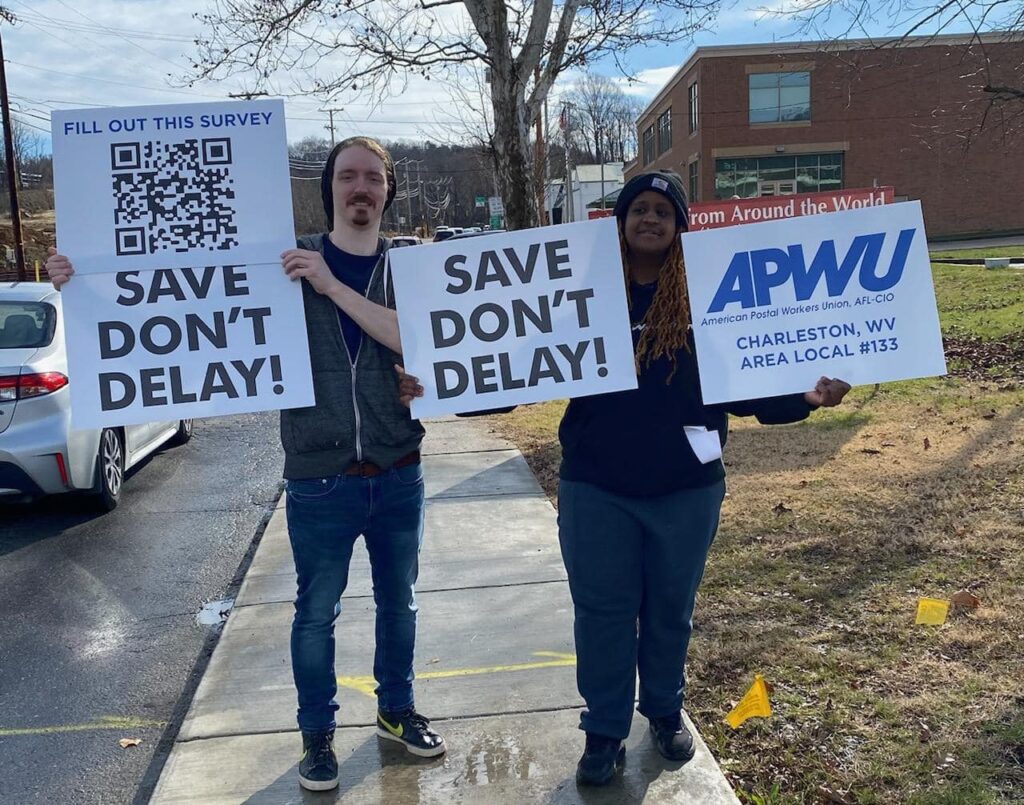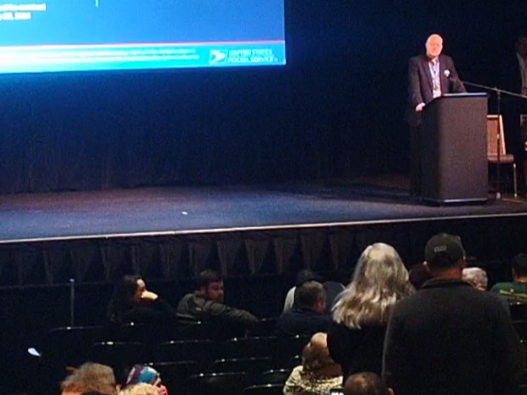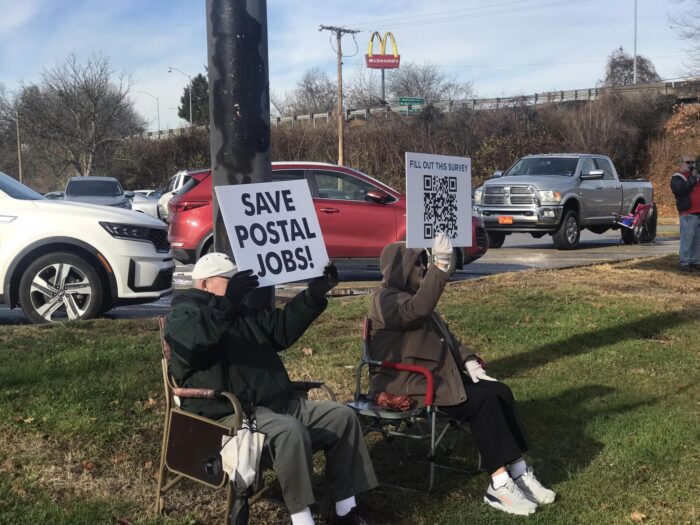When United States Postal Service (USPS) officials hosted a public hearing earlier this week, they hoped it would clarify the downsizing plans for a Charleston mail processing facility proposed last fall.
But representatives with the Charleston-based American Postal Workers Union (APWU) 133 said they left the hearing with more questions unanswered.
The Charleston Processing and Distribution Center is the only full USPS mail processing facility in West Virginia. With one final round of public comments on the USPS plans pending, union workers and state lawmakers are voicing concerns over the future of the facility and West Virginia’s mailing industry at large.
Changes To The Charleston Facility
Droves of concerned residents and postal workers filed into the Charleston Coliseum and Convention Center for the hearing Wednesday.
It came on the heels of months of intense protest beginning in the fall of 2023, when the USPS officials shared plans to move some local postal operations to Pennsylvania.
Findings published in January outlined these changes. The report said that certain West Virginia-based mail operations, like handling letters and smaller packages, would be transferred to Pittsburgh-area facilities.
It also stated that millions of dollars would be invested in improvements to the facility, like new mail sorting equipment and refurbished restroom and break room areas.
But Tim Holstein, vice president of APWU 133, said the need for these facility improvements reflects an already strained relationship between local workers and USPS officials.
“My question to the postal service is, if we’re concerned about LED lighting, better bathrooms and break rooms for employees, what have we been doing the last 30 years since that building has been there?” Holstein said.
According to Holstein, union frustrations with the USPS span longer than a few months. But the new slate of proposed changes has thrown into relief worries that union employees continue to hold.
A livestream of the USPS public hearing Wednesday evening shows community members and postal workers arising to address USPS officials and ask questions.
Credit: Courtesy of Tim Holstein/American Postal Workers Union 133
Union And Community Concerns
The proposed changes to the Charleston facility would bring no layoffs for career employees, according to the USPS findings.
In an email to West Virginia Public Broadcasting, Susan Wright — a USPS spokeswoman — said the initial plans would only affect 24 career employees, and that they would remain employed by the organization.
Wright did not specify what career changes might come for these employees. But Holstein said alternatives to layoffs, like transferring to another state, do not reflect the best interests of workers.
“We’re concerned that there possibly could be one of our members, if not more,” he said. “Multiple members could possibly be relocated or moved out of state, possibly uprooting families and lives.”
Debby Szeredy, executive vice president of the national APWU, visited Charleston to speak at Wednesday’s hearing. She said it is important that the USPS keeps these jobs local.
“These are good jobs for this community, and we don’t deserve to have them gone,” she said.
Additionally, both Holstein and Szeredy expressed concern that the changes would affect delivery times for West Virginia residents.
USPS officials have disputed this claim. During the hearing, USPS Coordinator Ted Hanson said “delivery services will be unaffected” by operational changes to the facility.
According to Wright, changes to the Charleston facility are part of a ten-year plan to enhance the USPS nationally through operational restructuring.
But Szeredy said that, time and time again, these changes only affect rural facilities and the communities that depend on them.
“Charleston does not deserve this. It’s actually very discriminatory, the case that all these rural sites are on our list,” she said. “There’s a number of them besides Charleston.”
Picketers line the roads of Charleston to voice concerns over potential layoffs at the state’s only USPS mail processing facility.
Credit: Courtesy of Tim Holstein/American Postal Workers Union 133
Eroding Trust
Holstein said that the buildup to Wednesday’s hearing has only exacerbated union frustrations with national USPS officials.
The hearing was initially slated for January, but was delayed with less than a week’s notice. It was rescheduled for Feb. 14, a holiday, and came after the USPS had already released its initial findings.
Together, Holstein said that these actions reflected an apathy on the part of the USPS toward union concerns.
“We believe that they did that with the malicious intent to keep the public away from hearing the truth,” he said.
Even lawmakers have taken part in voicing concern over how the hearing transpired.
Sen. Joe Manchin, D-W.Va, published an op-ed in the Charleston Gazette-Mail condemning the USPS “for not sufficiently communicating with stakeholders and impacted communities before final decisions are made.”
“I’m disappointed that we didn’t have that public hearing before they put their findings out,” Sen. Shelley Moore Capito, R-W.Va., told West Virginia Public Broadcasting Thursday. “That concerns me.”
USPS officials have stated they rescheduled the hearing because they needed more time to compile their findings, but Holstein said that the distrust it planted in union workers remains.
Meanwhile, Wright wrote that she and fellow USPS representatives understand the frustration local postal workers have for the proposed restructuring. “Change is uncomfortable and concerning for most people,” she wrote.
“It is important for our customers and employees to understand the [ten-year plan] is focused on improving all aspects of the Postal Service to ensure we are financially secure and operationally efficient for our immediate and long-term future,” she wrote.
But Holstein said that, until national USPS representatives are willing to work with his union to develop solutions by and for the local community, it is hard to believe they have workers’ best interest at heart.
“The problem is, the postal service has not approached the union in any sort of effort to try to make these changes, or to see what we can implement together as one to be productive,” Holstein said. “They haven’t done that.”
“Until they do that, obviously we look at this as a loss of trust,” he said.
























